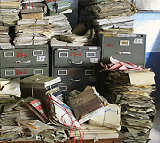 If any company considering its first export transaction actually read and tried to understand the recordkeeping requirements of Part 762 of the Export Administration Regulations (“EAR”), it is unlikely that anything would ever be exported from the United States. And although enforcement actions by the Bureau of Industry and Security (“BIS”) which promulgated and enforces these regulations are rare, they are not non-existent as Hardinge, Inc., the New York-based manufacturer of milling, grinding, turning and workholding machinery learned the hard way. Well, not that hard. The company signed at the beginning of the month a Settlement Agreement pursuant to which it agreed to pay BIS $3,000 for failure to keep records relating to its export of “metalworking and/or machine tools” to Israel. There was no allegation by BIS that the exported equipment was subject to any licensing requirements.
If any company considering its first export transaction actually read and tried to understand the recordkeeping requirements of Part 762 of the Export Administration Regulations (“EAR”), it is unlikely that anything would ever be exported from the United States. And although enforcement actions by the Bureau of Industry and Security (“BIS”) which promulgated and enforces these regulations are rare, they are not non-existent as Hardinge, Inc., the New York-based manufacturer of milling, grinding, turning and workholding machinery learned the hard way. Well, not that hard. The company signed at the beginning of the month a Settlement Agreement pursuant to which it agreed to pay BIS $3,000 for failure to keep records relating to its export of “metalworking and/or machine tools” to Israel. There was no allegation by BIS that the exported equipment was subject to any licensing requirements.
The recordkeeping requirements of Part 762 are, to say the least, extensive. Section 762.2 states:
The records required to be retained under this part 762 include the following:
(1) Export control documents, as defined in part 772 of the EAR;
(2) Memoranda;
(3) Notes;
(4) Correspondence;
(5) Contracts;
(6) Invitations to bid;
(7) Books of account;
(8) Financial records;
Just let that sink in for a moment. Let’s say one of your company’s salespersons receives a call from an overseas customer and he jots down on a piece of paper “Company X wants us to quote prices to export three cases of peanut butter to the U.K.” If you ship the peanut butter, but don’t retain the original of that note, you’ve broken the rule.
The rule does permit copies to be retained under section 762.5 but only if you comply with an onerous set of restrictions relating to the copies, including making a copy of the “obverse and reverse”* sides of paper documents. You also have to keep a record of “where, when, by whom, and on what equipment” the document was copied. You don’t have to be a management consultant to figure out that this is simply not going to happen.
Section 762.4 describes a number of documents exempted from the broad recordkeeping requirements of section 762.2. But these exemptions don’t include the note I described or other “notes” or “memoranda” regarding the transaction.
Of course, the charging documents and the Settlement Agreement don’t tell the whole story. It’s doubtful that it was just a salesman’s note that was involved. Still, the BIS requirements are extremely broad and quite easy for even a legitimately concerned and compliant exporter to trip over.
*”Obverse” and “reverse” are terms that are normally applied to coins and paper currency. The corresponding words for book pages, prints and drawings are “recto” and “verso.” And the words used by ordinary people who haven’t spent three years in law school or too much time in government agencies are, of course, simply “front” and “back.”
 Permalink
Permalink
Copyright © 2007 Clif Burns. All Rights Reserved.
(No republication, syndication or use permitted without my consent.)

 Posted by
Posted by  Category:
Category: 

